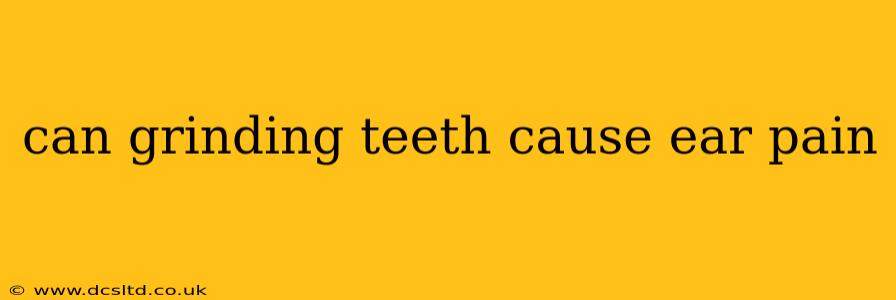Many people experience the frustrating and sometimes painful condition of teeth grinding, also known as bruxism. While often occurring unnoticed during sleep, the effects of bruxism can extend far beyond just worn-down teeth. One common and often concerning symptom is ear pain. But can grinding teeth actually cause ear pain? The short answer is: yes, it's a very real possibility. Let's explore the connection between teeth grinding and ear pain in detail.
How Does Teeth Grinding Lead to Ear Pain?
The link between teeth grinding and ear pain lies primarily in the temporomandibular joint (TMJ). This is the complex joint connecting your jawbone to your skull, just in front of your ear. When you grind your teeth, you're putting significant stress and strain on this joint. This can lead to a range of problems, collectively known as temporomandibular joint disorders (TMD).
The TMJ's proximity to the ear is crucial here. The pain you feel in your ear isn't necessarily in the ear itself, but rather referred pain originating from the irritated TMJ. This is because the nerves supplying the TMJ and the ear are closely intertwined. When the TMJ is inflamed or damaged, this nerve irritation can manifest as pain in the ear, often accompanied by other symptoms.
What Other Symptoms Might I Experience Along with Ear Pain?
Experiencing ear pain alongside teeth grinding could indicate a TMD problem. Here are other symptoms you might notice:
- Jaw pain: This is one of the most common symptoms of TMD. You may feel pain in your jaw muscles, especially when chewing or opening your mouth wide.
- Headaches: Tension headaches are frequently associated with TMJ disorders due to the muscle strain and nerve irritation in the jaw and surrounding areas.
- Neck pain: The muscles in your neck often compensate for jaw tension, leading to pain and stiffness in the neck.
- Clicking or popping in the jaw: This sound is often heard when opening or closing your mouth, indicating dysfunction within the TMJ.
- Difficulty opening or closing your mouth: This limitation in jaw movement is a significant symptom of TMD.
- Facial pain: Pain can radiate to other areas of the face, not just the jaw or ear.
- Dizziness: In some cases, TMD can cause dizziness or vertigo due to its effects on the balance system.
Can Grinding My Teeth Cause Ear Infections?
While teeth grinding doesn't directly cause ear infections (which are typically bacterial or viral), the inflammation and irritation in the TMJ associated with bruxism can sometimes be misinterpreted as an ear infection. The referred pain in the ear from the TMJ can mimic the symptoms of an ear infection, making it difficult to distinguish between the two. If you're experiencing ear pain and suspect an infection, seeking professional medical advice is crucial.
How Can I Tell if My Ear Pain is Related to Teeth Grinding?
Pinpointing the exact cause of your ear pain requires a professional assessment. However, some indicators might suggest a connection to teeth grinding:
- Waking up with jaw pain: If your jaw feels sore or tired when you wake up, it's a strong indication of nighttime bruxism.
- Noticeable teeth grinding: If you or your partner has noticed you grinding your teeth during the day or night, that's a key sign.
- Pain worsens with jaw movements: If chewing or opening your mouth widely intensifies your ear pain, it points towards a TMJ issue.
What Should I Do if I Suspect My Ear Pain is Due to Teeth Grinding?
If you suspect your ear pain is related to teeth grinding, consult a dentist or a specialist in TMJ disorders (an orthodontist or oral surgeon). They can properly diagnose the problem, rule out other potential causes, and recommend appropriate treatment. Options may include:
- Mouthguards: Custom-fitted mouthguards can help protect your teeth and reduce the stress on your TMJ during sleep.
- Stress management techniques: Stress often exacerbates bruxism, so relaxation techniques like yoga, meditation, or therapy can be helpful.
- Medications: In some cases, pain relievers or muscle relaxants may be prescribed to manage pain and inflammation.
- Physical therapy: Jaw exercises and physical therapy can help improve TMJ function and reduce pain.
Don't ignore ear pain associated with teeth grinding. Seeking professional help is essential for proper diagnosis and effective treatment to alleviate pain and prevent long-term complications. Early intervention often leads to better outcomes.
